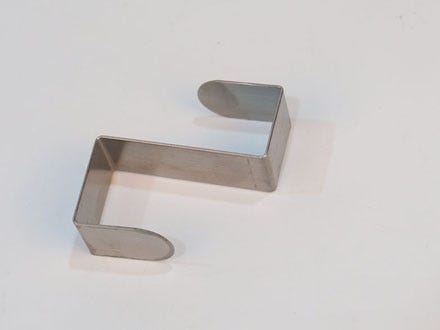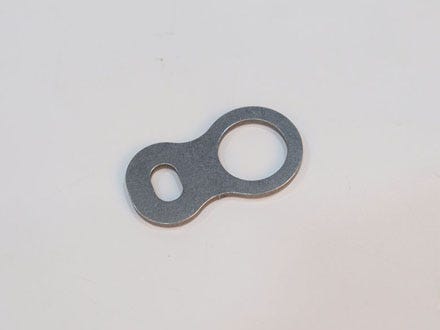Precision metal stamping is a manufacturing process that uses custom tooling and dies mounted in a press to turn sheet metal into the desired component. It is used in a wide range of industries to manufacture a large number of parts and products with high precision, accuracy and speed. While this process offers manufacturing advantages, it is not suitable for every production project.
The following article discusses some considerations to keep in mind when determining if precision metal stamping is right for your project. It outlines the process, the benefits it offers, and the typical industries that use it.
Metal stamping (sometimes referred to as pressing) relies on specialized tools (i.e., tool and die sets) and equipment (i.e., presses) to form sheet metal and coils into the desired shape and size. The pressure applied to the workpiece by the press forces the material to conform to the shape formed by the tools and dies.

V Shape Spring Clip
Depending on the simplicity or complexity of the final product, this process can occur in a single stage or across multiple stages. Precision metal stamping operations rely heavily on the use of automated equipment to ensure that the finished part is both precise and accurate.
In addition to greater precision and accuracy, the precision metal stamping process offers several other advantages over other manufacturing processes, including
Higher product and process quality. The accuracy provided by the precision metal stamping process translates into a lower error rate in the production process. This means there is less chance of producing defective or faulty parts that make it into the hands of the customer.
Lower production costs. A generally automated process, precision metal stamping alleviates the need for manual labor. This quality also reduces error rates, which in turn reduces material utilization and waste in the production process.

Stainless Steel S Shaped Hook
In the aerospace industry, parts and products are subject to strict manufacturing requirements and restrictions. These guidelines are in place to ensure the safety of the people on board the aircraft, the passengers and the public. For this reason, aerospace component manufacturers (e.g., Huicong Hardware) maintain certifications and comply with various industry standards, such as Mil-spec and RoHS. some of the metal stamped parts and products typically produced for aerospace applications include
Assemblies
Brackets
Bushings
Clips
Lead frames
Shields
Terminals
Wire forms

Metal Stamping Gasket
Metal Stamping for AutomotiveIn the automotive industry, stamping is used to create a variety of structural and functional parts used in vehicle bodies and frames, electrical systems, steering systems, and more. Some examples of typical automobile parts made in metal stamping operations include:
Brackets and hangers
Electrical terminals and connectors
Wire forms (e.g., tire and under chassis components)
Medical device metal stamping is similar to the aerospace industry in that the medical device industry has many standards that govern how components are manufactured. These exceptionally high standards ensure the safety of physicians and patients. Standard and custom metal stampings are found in a variety of medical devices, including
Connectors, couplings, and fittings
Equipment housing and sleeves
Implants and prosthetics
Pump and motor components
Surgical instruments and equipment
Temperature probes
Precision metal stamping processes play a key role in the production of components for many industries. For customers who are looking for an experienced and knowledgeable metal stamping partner, Huicong Hardware has you covered.
At Huicong Hardware, we offer custom metal stamping solutions. With our extensive manufacturing experience and state-of-the-art manufacturing facilities, we can meet virtually any metal stamping requirement with high-quality product solutions.
The source is from here.
Copyright:@2020-2021
Comments Please sign in or sign up to post.
0
0 of 500 characters used